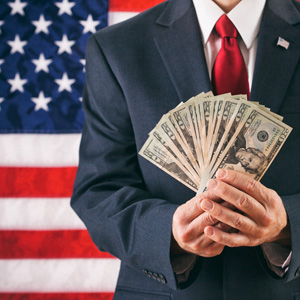Once again, judiciary pushes back date when funds will run out, says this is final extension

Updated: For the third time, the federal judiciary has pushed back the date it expects funds for federal court operations to run out. The funds are expected to be depleted on Jan. 31, according to a press release.
Previously, courts had estimated the money would run out on Jan. 18 and then Jan. 25. The National Law Journal, Bloomberg and Reuters have coverage.
Courts have been tapping court fees and other funding sources to continue most operations. Courts and federal public defender offices have been able to extend the deadlines by delaying expenses such as new hires, travel unrelated to cases and new contracts. But court-appointed private lawyers are currently working without pay, the New York Times reports.
Some federal courts already have postponed civil cases in which the government is a party because of requests from the Department of Justice. If there is no resolution to the shutdown, when the money runs out nonessential court employees likely will be sent home. Others will be working if it’s necessary “to support the exercise of Article III judicial powers,” according to a provision of the federal Antideficiency Act.
Supreme Court justices, as well as district and appeals judges, would continue to be paid because of Article III, which says their pay can’t be diminished, according to the National Constitution Center and the New York Times, which cited information from the Congressional Research Service.
“Court officials are grappling with all sorts of complications that could arise” when the money is gone, according to the Times article, “including the possible effects on court reporters and court interpreters, as well as on jurors who are supposed to be paid for their service and reimbursed for transportation expenses.”
Jurors working without pay may spur concerns about a rush to judgment, pointed out U.S. District Chief Judge Ruben Castillo of Chicago.
Courts are developing individual responses, according to the Times. The 9th U.S. Circuit Court of Appeals at San Francisco is considering closing appellate courthouses to the public one day per week and furloughing employees that day. In Brooklyn federal court, some employees would be furloughed, and courthouses could no longer be used by groups such as bar associations and continuing legal education providers for meetings and classes.
The federal courthouse in Manhattan, meanwhile, is consulting its pandemic plan to evaluate which work is essential.
ABA President Bob Carlson has said the ABA is “deeply concerned” about the shutdown. His Jan. 16 statement called for the White House and Congress “to reach a solution that, at the very least, funds agencies not directly implicated in the controversy over a border wall.”
The shutdown is also affecting the FBI, although agents continue to work without pay, the Atlantic reports. The FBI Agents Association has been compiling complaints about hurdles caused by a lack of resources from agents who are speaking anonymously.
Work is being slowed because confidential sources are going unpaid, subpoenas are not being delivered, and agents whose security clearances aren’t being processed have been locked out of computer systems. One person said indictments have been delayed.
The shutdown is also having consequences for would-be lawyers. Swearing-in ceremonies for new lawyers in Washington, D.C., originally scheduled for Jan. 25, have been postponed because of employee furloughs in the District of Columbia Court of Appeals’ Committee on Admissions & Unauthorized Practice of Law, according to its website. However, people who already have been notified that they are certified for admission can be sworn in under an in-absentia procedure.
On Wednesday, the admissions committee was still planning to administer the February bar exam but was warning test takers to monitor its website for further developments. The warning prompted the New Jersey Board of Bar Examiners to offer state residents and law grads who had registered to take the Uniform Bar Exam in Washington, D.C., to apply to take the exam in New Jersey.
Updated on Jan. 24 at 2:30 p.m. to include information from Atlantic story.
See also:
ABAJournal.com: “Federal judiciary says money won’t run out just yet”
ABAJournal.com: “Federal employees forced to work without pay during government shutdown lose bid for TRO”
ABAJournal.com: “How some law firms are affected by the government shutdown”
ABAJournal.com: “What the government shutdown looks like inside federal prisons”
ABAJournal.com: “ABA offers free CLE to lawyers impacted by partial government shutdown”
ABAJournal.com: “Shutdown halts many immigration hearings; federal courts could be affected”
ABAJournal.com: “What happens after federal courts run out of money to continue operations?”
Write a letter to the editor, share a story tip or update, or report an error.


